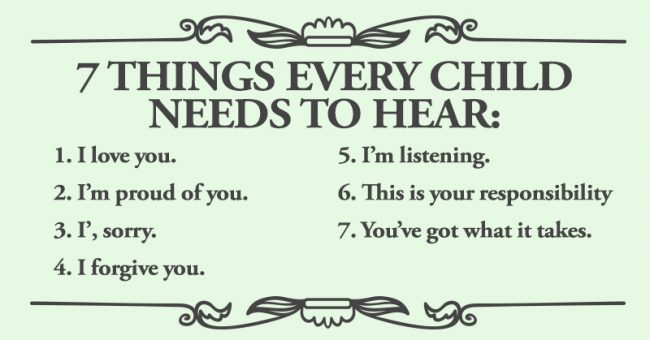Are you struggling to lose weight and maintain a healthy diet? You may have a toxic fatty acid that blocks weight loss.
Here's how a simple “Ice Hack” speed up my fat loss and helped me restore my health, watch now.

A child is a gift and a blessing to every family. Yet, it is the most difficult job you can do in your life. Each child has a different story and has a unique character So, providing adequate supervision and care is a major obligation to shoulder.
Parents are the role models for their children Every word they speak and each action they take as well as the tone of their words can affect the psychological as well as emotional development of their child.
The introduction of children to the world of parents is not a surprise however it’s an undiscovered experience that is a territory that is not explored by their parents. So, they require some time to become used to being cautious before they speak.
Parents aren’t perfect like everyone else, however, making sure that the method is clear particularly during the early stage of the development of the child is essential.
To ensure a healthy, confident, and stable young child parents must insist upon a proper manner of communication and refrain from yelling or yelling at their children. Kids can be extremely emotional.
Here are 7 things every child needs to hear to ensure their future is bright:
1. I Love You
Your child doesn’t know you love him like they do. So ensure that you express it with sincere emotion and demonstrate your love throughout the day. Remind your children that you love them even after they’re adults. This will make them feel that they can count on you and they’ll feel secure happy, secure, cherished, and loved.
2. I’m sorry
Apologize when you’re late, you were unable to attend their game or had too much to do to be able to enjoy any more quality time together. Also, be sure to apologize when you’ve exploded in anger or were unable to be in control of your behavior in front of their children and caused harm to them in some manner. This will help them learn to accept their mistakes and not repeat their behavior.
As per psychology professor Dr. Sherrie Campbell: “When we admit our mistakes We teach our children through example how to be the same. This builds humility.”
3. I’m proud of your achievements
To increase the confidence of your child, let him know how proud you are of your achievements and growth and encourage his determination to become better. Your children should recognize their potential and to work hard to be successful in whatever area they decide to pursue. Children require praise more than criticism.
4. This is your responsibility
Be the couch of the game. Prepare your children to play by cheering from the sideline, and finally examine their performance. Be sure to assign your children the responsibility of teaching them how to manage obligations.
It is possible to ask them to cook breakfast for you all or water the plants, visit the mall, and visit with their grandparent on weekends.
5. I’m listening.
When your child is at a teens, you will no longer control them the situation, and all you’re left to do is be being a positive influence. Be attentive to what your children are saying even if they’re extremely small. Make sure you emphasize the importance of communicating as an opportunity to express your emotions and increase the bond between you and your child.
6. You’ve got what it takes
Teach your children to never give up , and never doubt their capabilities. Inspire them to strive to be successful even failing, their next one will be a success.
7. I forgive you.
Parents should not allow bad behavior to go unchecked as inability to discipline can cause destruction. However, do not neglect to teach your children the importance of forgiveness, in order to get rid of disappointment and anger. Remind them that you love them.
Being a parent implies that you’ll be a bit of being a teacher when raising your children. Communicating is perhaps the most effective method to develop your children to become compassionate, responsible and self-aware adult.
So, in order to ensure they’re paying attention to what you communicate, do not shout or shout. Try to use a gentle tone and try to look at things from the perspective of your audience.
Be careful not to be too sweet and don’t use too many words, but make sure you emphasize the main point. It is possible to tell a true incident. Change your language in case you feel that you’re not being understood.
Do not repeat the questions. At the end of your talk take their hand and hold it, or even touch their shoulder.
Keep in mind that children thrive on being surrounded by positive attention. So, continue to remind that you cherish and appreciate them even if they’ve committed mistakes. Make sure you choose the right words to employ, and they’ll be more attentive to your message. Don’t overestimate the power of positive feedback.
Source: joshshipp.com











